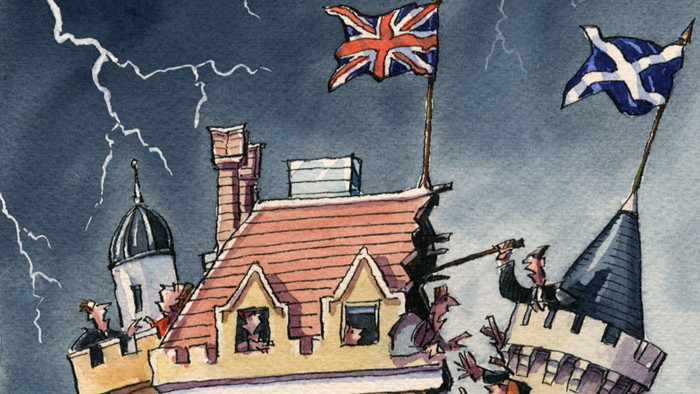This is a very bad time to break up Britain


Roula Khalaf, Editor of the FT, selects her favourite stories in this weekly newsletter.
Until recently, I thought I did not much care if Scotland voted for independence. But, now, as the prospect becomes very real, I am surprised by how upset I feel. I follow the polls obsessively. I fume at the incompetence of the No campaign and the insularity of the Yes. And my sense of foreboding grows as the day grows closer.
Why should that be? The answer is that the Scottish referendum has made me realise how much my own sense of identity, and personal security, is tied up with my British nationality. Meanwhile my job – covering world affairs – tells me that the world is in a more dangerous state than for decades. That makes it a terrible time to break up Britain.
As the child of immigrants, I always feel a sense of gratitude and pleasure when I write on a customs form: born London, nationality British. My forebears were not so lucky. My grandparents were Jews from different parts of eastern Europe who emigrated to South Africa in the years before the Holocaust. My parents emigrated again, not wanting to live or bring up children in apartheid South Africa. It feels like a personal triumph that my own children were born in the same country as me.
My ingrained sense that Britain represents stability is reinforced by my travels – often to more troubled parts of the world. I spent last week in Ukraine and felt lucky, as ever, to be able to return to my own safe corner of the world.
Britain’s political stability is what set this nation apart from the rest of Europe in the 20th century. All the other big nations experienced dictatorship or defeat or civil war or tyranny. Britain remained free, stable, democratic and apparently immune to fanaticism.
If the United Kingdom breaks up, that deep stability will be shaken. It is not that I expect civil war to break out. But I do not think a divorce between Scotland and England will be easy or friendly. There will be arguments about the currency, about the debt, about oil. Above all, there will be bruised and bitter feelings on both sides. On a personal level, I feel affronted to hear Scottish nationalists accuse the English of not caring about social justice, or of being narrow-minded and warmongering. That is not my experience, or the experience of millions of other immigrant families that were welcomed into England. Indeed, while the rhetoric of Scottish nationalism sometimes attacks the English for their alleged chauvinism, it is noticeable that England is a much more racially diverse country than Scotland.
I suspect that my own irritation with the rhetoric of Scottish nationalism is widely shared in England. That will mean that, at least for a while, that the English are unlikely to adopt a magnanimous attitude in any negotiations on independence. This could turn nasty quite quickly. In fact, even a narrow No vote could leave a legacy of frustration and resentment on both sides of the border.
Even in good times, I would worry about the implications of the break-up of the UK. But the current international environment is grimmer than for decades. An angry Russia has just annexed part of a neighbouring country. President Vladimir Putin boasts of his country’s nuclear arms and his ability to over-run Ukraine in two weeks. The EU he faces is weak and divided. The US is more detached than it has been for years. A far-right candidate has just topped an opinion poll for the next French presidential race. Meanwhile in the Middle East, a jihadist death cult has seized control of large parts of Iraq and a murderous civil war is raging in Syria. Hundreds of thousands of desperate refugees will wash up on the shores of Europe this year.
These troubles are lapping at the borders of the United Kingdom. Anybody who has witnessed the thousands of would-be migrants desperately trying to make it across to the Channel to England (before doubtless realising their mistake and heading for socially just Scotland) will have seen a vivid illustration of how global security issues affect everyday life.
Yet the Scottish referendum campaign has been conducted as if the rest of the world stops at London. There has been almost no discussion of foreign affairs – apart from the nationalists’ inane refrain that a morally superior Scotland will not have to join in “illegal wars”. The nationalists also insist that an independent Scotland will get rid of nuclear weapons. (Ukraine did just that, when it became independent, and now bitterly regrets it.)
Anybody who suggests the security situation in Europe might be relevant to Scotland’s referendum campaign is shouted down for scaremongering. Alex Salmond, the leader of the Yes campaign, has even talked of his admiration for the way Mr Putin has restored Russian pride – remarks that were made as Russian troops were moving into Crimea.
If the world keeps going bad, the Scottish nationalists could soon discover that there are many worse and more dangerous people in the world than the hated “Tory toffs” in London. By then, however, it could be too late. If the vote goes the wrong way on Thursday, the UK will break up. George Robertson, a proud Scot and a former head of Nato, was not exaggerating when he said that the “forces of darkness” in the world would love that.
Twitter: @gideonrachman
——————————————-
Letter in response to this column:
Scotland is not to blame for England’s shrill euroscepticism / From Ms Kirsty Hughes
Comments